Magdalina Guenova: In Bulgaria There Is a Pseudo Democracy
Adelina Marini, October 29, 2013
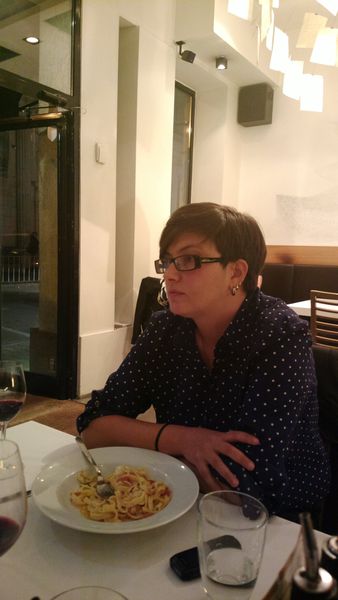 The anti-systemic protests in Bulgaria continue. Although they melted in terms of a number of physical participants in them, they got a new impetus with the rebellion of students in several Bulgarian universities. But the protests, as much as they are aimed against the oligarchy and the fact that in 24 years practically a facade democracy has been established, in the opinion of a majority of analysts, they are only the tip of the iceberg. Bulgaria not simply has gone back to the starting point of the transition, but is in even worse condition because the energy and euphoria from the beginning of the 1990s is no longer there. A large part of the people who then were at the front lines of the protest, are also gone - either they left the country or have become a part of the status quo. The levels of faithlessness, pessimism and apathy are getting thicker by the day in the already difficult to breath air in Sofia. There are no sufficiently strong figures among the active citizens, as well, whom people can trust and line up behind them.
The anti-systemic protests in Bulgaria continue. Although they melted in terms of a number of physical participants in them, they got a new impetus with the rebellion of students in several Bulgarian universities. But the protests, as much as they are aimed against the oligarchy and the fact that in 24 years practically a facade democracy has been established, in the opinion of a majority of analysts, they are only the tip of the iceberg. Bulgaria not simply has gone back to the starting point of the transition, but is in even worse condition because the energy and euphoria from the beginning of the 1990s is no longer there. A large part of the people who then were at the front lines of the protest, are also gone - either they left the country or have become a part of the status quo. The levels of faithlessness, pessimism and apathy are getting thicker by the day in the already difficult to breath air in Sofia. There are no sufficiently strong figures among the active citizens, as well, whom people can trust and line up behind them.
Such a figure is Madgalina Guenova, known in Bulgaria also as the Nervous Shark. A blogger, gourmet and gastronome, multi activist, including a gay rights activist, economist by education, working for a foreign IT firm in Bulgaria. A person who will not hesitate to signal a violation and to take the consequences for this - being interrogated, often humiliated. A person who, although politically active - she is a member of one of the small right-wing parties which dropped out from the current National Assembly (Democrats for Strong Bulgaria) - she puts truth and justice first. She believes that one should go for the facts even for their greatest enemies and not allow defamation, mocking and empty accusations.
I met Magdalina in the end of September in Sofia. The protests, provoked by the appointment of one of the most controversial figures in the Bulgarian transition - Delyan Peevski - to head the powerful State Agency for National Security (DANS), have just turned their first one hundred days. It all seems, though, that they will not be the last. What have they achieved, is the big question, the answer to which is difficult. Magdalina believes that things looked much more encouragingly by the 50th day. The main goal has not been achieved, which is the government to resign, but, instead, many citizens have been awaken. There are others, though, who do not see a reason and wait for the next level of the protest. Although the main demand is the resignation of the current government, the protest still is anti-systemic, Magdalina believes, in spite of the many attempts compromised parties to attach themselves to it.
What is wrong with the system?
In practise it has never been reformed genuinely. Neither the political nor the economic or the system of social relations. The political life went to the wrong direction in the very beginning and the people remained with a bitter taste in their mouths as early as with the first elections in 1990, because at many places there were not verified, she stresses, doubts of manipulations, buying of votes. The elections are one of the main problems because there is a shopping of votes even now, which was noted by the European Commission as well in its reports under the Cooperation and Verification Mechanism (CVM). Apart from the buying of votes, not rare are vote management or manipulations through opinion polls, but also the role of media. "And when one does not believe that the elections are legal, they stop trusting the entire system". Something which can be seen with a bare eye in the last early elections on May 12, when half of those eligible to vote cast a ballot.
The voting system must be reformed together with the judiciary, the health care and the pension system, which are "broken", as Magdalina Guenova explains. Because, unless things are repaired, they will continue to have an impact on the economy. The blogger draws a pretty dark picture against the backdrop of the recently announced new loan of the government to finance the growing gap in the budget. "You cannot borrow until the end of time, while pensions will not be increased, the prices, though, will rise because even if the European context gets improved a little with monopolies and taking over of enterprises by certain people and with oligarchic pressure there is no way things to be repaired. When there is no money, there will be no pensions, no salaries for the public sector, no economic growth for the private sector. And things will continue to fall deeper. The pension and health care systems will fall apart".
The pseudo democracy of oligarchy
One of the questions that torments every one who is deeply involved with the developments in Bulgaria in the past 20 years, is is there, in fact, a democracy in the country? This question is especially valid against the backdrop of the attention the European Commission paid to Hungary and Romania, but omitted Bulgaria. Magdalina Guenova explains this "omission" by saying that, in fact, in Bulgaria everything on paper looks pretty good. No one has ever tried to change the Constitution and even the legislation in many aspects is quite good. There is, of course, what to demand of it to be improved, like, for instance, the Penal Code which the European Commission, too, has been waiting for years to be amended. The labour code also needs to be urgently changed, but in general the legislation is quite good, but is not being applied. On paper, there is no discrimination here because no one signals of such or the trials are suspended. There is no statistics.
She says that most of the litigations of racial hatred are suspended. She has a personal experience with that. According to a high official, a very well informed source, in Bulgaria there is a government policy not to register hate crimes. A policy that is being followed by all governments. And that can easily be seen in the statistic data of the Fundamental Rights Agency of the EU. Bulgaria is one of the few EU member states where the level of hate speech, racism and xenophobia is the highest. Bulgaria is also among the countries, which regretfully are not a few, where there is almost no information about such 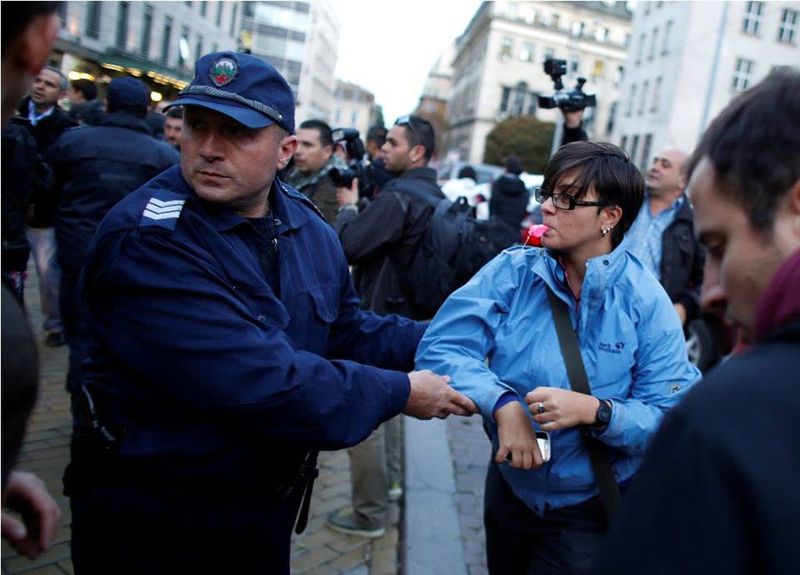 crimes which confirms Magdalina Guenova's words, who is also a gay activist and knows very well this quite ugly side of the Bulgarian society.
crimes which confirms Magdalina Guenova's words, who is also a gay activist and knows very well this quite ugly side of the Bulgarian society.
In Bulgaria, she says, there is no protection for the sexual minorities in the Penal Code. There are some legal texts in the Law on Protection from Discrimination, but it only envisages administrative measures. And although the Prides take place successfully, which has become one of the key conditions in the enlargement process of the EU for the countries from the Western Balkans and Turkey, in Bulgaria the situation below the surface is more than disturbing with the active participation of media who gather together xenophobes and gay activists. "One says 'you have no right to live', the other 'we have to live'. I have long stopped counting for how many years the debate has not moved from that level. And we are talking about all kinds of human rights". After that statement I found it inappropriate to ask what is the situation with the same sex marriages, which is one of the leading topics in the Croatian society for almost a year now.
It is astonishing to find out that the Bulgarian family code is among the most conservative ones. Not only that it does not envisage same sex partnerships, but the cohabitation of opposite sex couples is also not present. Moreover, it is explicitly said in the Constitution, under Article 46, that marriage is a voluntary union of a man and a woman and also that only legal is the civil marriage. Currently, in Croatia, for instance, signatures were collected to initiate a referendum on whether the same should be incorporated into the Croatian Constitution. The issue of fundamental rights and the fear of reporting violations is another of the reasons why Magdalina believes that in the country there is a pseudo democracy. Starting with the freedom of expression first, which, in fact, is absent.
Here and there there are small islands, but even there this is not always the case. Often self censorship can be observed. Another thing is that the judiciary has turned into an apparatus for oppression, which was deepened by merging of DANS with the General Directorate for the Fight Against Organised Crime (GDFOC). Magdalina Guenova brings forward evidence by listing the cases of pressure over oligarchs or ordinary businessmen to clear the path for only one oligarch. She recalls the articles of one of the really few investigating reporters in the country - Rossen Bossev from Capital Daily. He begins one such article of his on how the judiciary is being used to settle corporate accounts with a quote by former Chief Prosecutor Boris Velchev. "Unfortunately, I know the ease with which a person can be brought to justice. In spite of my confidence that this should not be a regular practise, in some cases this could be ordered. Business competitors can settle accounts through the 'service' of a prosecutor to initiate a prosecution and soon after to suspend it for the lack of grounds".
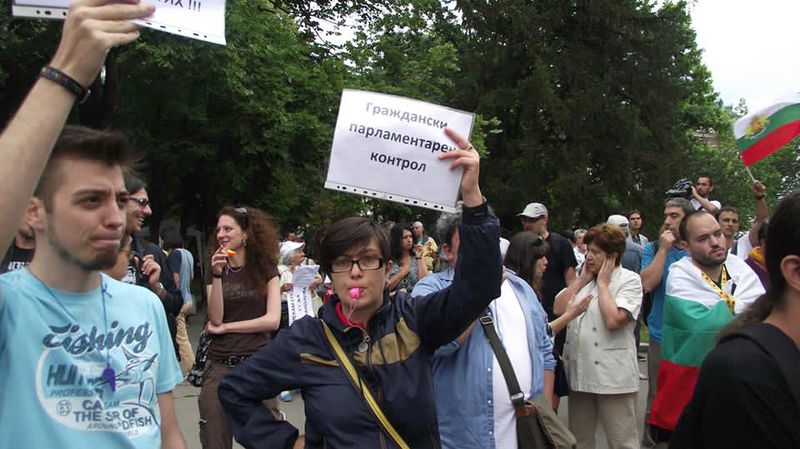 The police and the judiciary have remained unreformed ever since November 10th, says the Nervous Shark. To her, the CVM of the European Commission does not work quite well. The reason, however, is not with the Commission. "This cannot be repaired without some public consent and without parties. I think that this is the reason why the Mechanism does not work because, in our case, this is a job of the country to do it. I believe that, in this respect, Europe does not have sufficient powers, especially for the judiciary". And how can there be a consent when currently there is an "incredible hatred", in her words. "There are problems at a very basic level. We do not have any unifying values of the nation. There should be some common understandings. They probably come from the fact that initially we divided ourselves into rusophiles and rusophobes. Into turkophiles and turkophobes. And the things are from much older times".
The police and the judiciary have remained unreformed ever since November 10th, says the Nervous Shark. To her, the CVM of the European Commission does not work quite well. The reason, however, is not with the Commission. "This cannot be repaired without some public consent and without parties. I think that this is the reason why the Mechanism does not work because, in our case, this is a job of the country to do it. I believe that, in this respect, Europe does not have sufficient powers, especially for the judiciary". And how can there be a consent when currently there is an "incredible hatred", in her words. "There are problems at a very basic level. We do not have any unifying values of the nation. There should be some common understandings. They probably come from the fact that initially we divided ourselves into rusophiles and rusophobes. Into turkophiles and turkophobes. And the things are from much older times".
This is how, with huge pessimism, we say good-bye to each other. She stays in Sofia where she continues to be almost every day in the protest, to write in her blog and to post in the social networks questions, appeals and positions. How long will she do that, I asked her before leaving. "In principle, I do not give up", she answered. The real question now, though, is how many people have already given up and believe that it is hopeless to fight the country back from the mafia and to finally start a genuine transition after a solid conversation about the past.
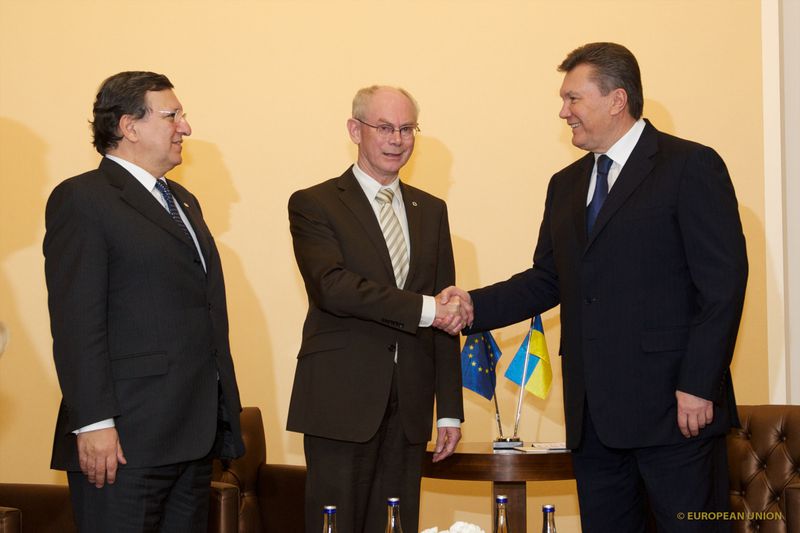 Jose Manuel Barroso, Herman Van Rompuy, Viktor Yanukovych | © Council of the EU
Jose Manuel Barroso, Herman Van Rompuy, Viktor Yanukovych | © Council of the EU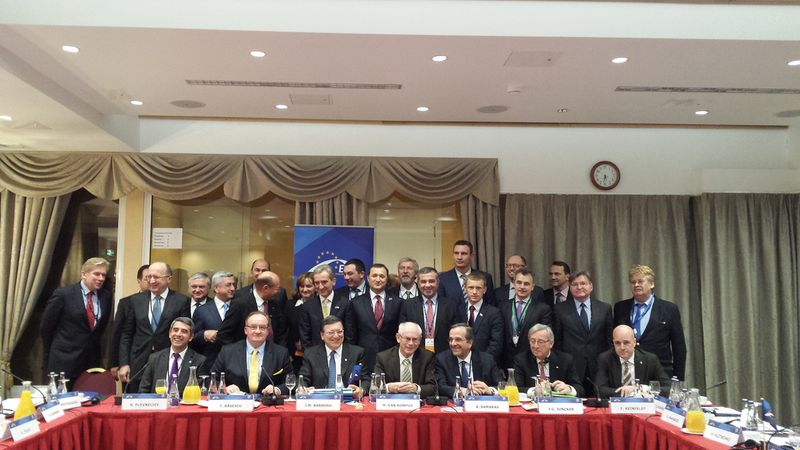 | © EPP
| © EPP | © euinside
| © euinside